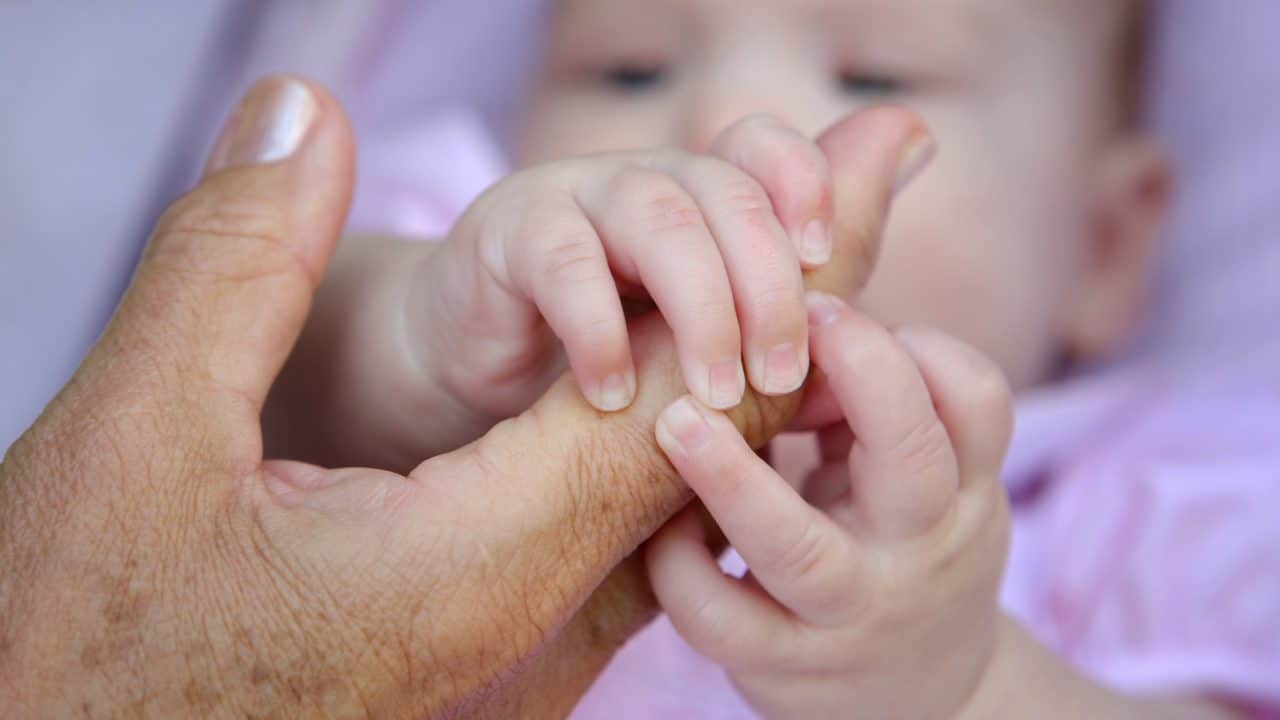By Claire Lerner
Recent research on the impact of drinking during pregnancy has led to the recommendation that women consume no alcohol during pregnancy. Even small amounts can have a negative impact on a baby’s development.
IN THIS RESOURCE
- Your Experience
- What Is FASD?
- What Are the Signs and Symptoms of FASD?
- How Is FASD Diagnosed?
- What Can You Do to Support Babies and Toddlers With FASD?
- References
Your Experience
As a grandmother or grandfather, you are juggling several different roles. One of them is grandparent to your grandchild—and one is still parent to your adult child. This means that you probably still worry and care about your adult child, just as you do your grandchild. If your grandchild’s mother drank alcohol during her pregnancy, you may have been concerned about her health and habits, as well as the baby’s health. Recent research on the impact of drinking during pregnancy has led to the recommendation that women consume no alcohol during pregnancy. Even small amounts can have a negative impact on a baby’s development.
As a caregiver for your grandchild, you may be seeing some behaviors or other developmental signs that concern you. This resource is designed to provide information about how drinking alcohol during pregnancy can impact babies and toddlers and what you can do to support your grandchild’s learning and development.
What Is FASD?
Fetal Alcohol Spectrum Disorder (FASD) is a term used to describe a range of conditions that can develop in a person whose mother drank alcohol during her pregnancy. 1 These effects may include physical, mental, and behavioral challenges, and learning disabilities. The effects of FASD can range from mild to severe and can impact an individual across his life.
What Are the Signs and Symptoms of FASD?
Children can be impacted by FASD in a variety of ways.
- Prematurity
- Small head size
- Distinctive facial features, such as small eyes, thin upper lip, and a smooth ridge between the nose and upper lip
- Low muscle tone and poor coordination
- Delays in all areas of development, including walking, talking, and toilet training
- Sleep disturbances—babies may have a hard time going to sleep and wake frequently
- Excessive crying/irritability—babies may be difficult to soothe and comfort
- Difficulties with sucking (feeding) as a baby
- “Failure to Thrive”—babies may have difficulty gaining and maintaining their weight
- Extreme sensitivity to sound and/or light—children may get easily overwhelmed in stimulating settings like the mall
- Hyperactive behavior—the child may seem to be moving all the time.
- Difficulty paying attention and following directions
- Poor memory
- Vision or hearing problems and/or problems with the heart, kidneys, or bones
How Is FASD Diagnosed?
Diagnosing FASD can be hard because there is no medical test, blood test, or genetic test for it. Health care providers usually use a combination of techniques to diagnose whether a child has FASD, starting with learning more about the mother’s alcohol use during pregnancy. The health care provider will also consider your grandchild’s appearance (looking for certain facial features) and review her growth, medical history, and overall development.
What Can You Do to Support Babies and Toddlers With FASD?
Below are some strategies for supporting your grandchild. You may want to share these ideas with the other adults who help care for him, such as child care providers or family members.
1. Develop and follow routines.
Routines teach your grandchild what he can expect and make him feel safe and secure. This is especially important for a child with FASD.
2. Reduce noise and keep the lights low—this is a helpful calming strategy when the child is feeling out of control.
At night, it can help children sleep better as well.
3. Notice how your grandchild manages sensory information (noise, light, activity, textures, etc.).
Children with FASD often have a hard time managing lots of sensory input at one time. They may get overwhelmed and “lose it.” When this happens, slow things down and provide a quiet, comforting place for your grandchild to calm down.
4. Try a range of calming techniques and see which work best.
This might be a warm bath, a lullaby, a favorite story or song, gentle rocking, a massage with baby lotion. Every child is soothed differently. And what worked yesterday may not work today.
5. Work closely with your grandchild’s health care provider to monitor weight gain.
Make sure your grandchild’s health care provider knows that the mother drank alcohol while she was pregnant.
6. Provide close supervision.
Because children with FASD often have difficulty understanding cause and effect, they sometimes make impulsive decisions and then are surprised at the outcomes.3 Keep your grandchild safe by providing close supervision.
7. Recognize that your grandchild’s emotional development may resemble that of a younger child.
For example, if your grandchild is 3 years old, she may have the self-control of a child who is 1 year old. By adjusting your expectations, you may find it easier to understand why your grandchild is behaving the way she is.
8. Give your grandchild time and repeated opportunities to learn new things.
You may find that your grandchild needs to be taught and re-taught the same skill (like putting together a puzzle) or the same rule (like hanging his jacket) many, many times before he masters it. Memory is affected by FASD, which makes it more difficult for children to learn and remember new things. It can help if you post photographs to serve as reminders of everyday tasks (such as washing hands and brushing teeth).
9. Use clear, simple language.
Speak slowly and use 3 to 4 word sentences. Be specific about what you mean. Instead of saying, “clean up your toys,” it would be more helpful to say, “Put your cars in the basket.” This helps your grandchild understand what actions are involved in the task at hand.
10. Be patient.
Children with FASD often process information more slowly than others. When you ask a question, it may take a while for your grandchild to respond. When you give her time, it teaches her to feel confident in her communication skills.
11. Contact your local early intervention provider.
Early intervention professionals will come to your home—free of charge, through your local government—to help you support your grandchild’s physical, intellectual, communication, and social skills. You can find the phone number for your early intervention office by calling your county government or by visiting:
- The National Dissemination Center for Children With Disabilities: http://nichcy.org/babies/services/
- The Parent Center Network: www.parentcenternetwork.org/
- The National Early Childhood Technical Assistance Center: www.nectac.org/contact/ptccoord.asp
12. Take a break when you can.
Caring for a young child with FASD is challenging at times. Remember that it is normal to feel anger, guilt, sadness, hope, and more—sometimes all on the very same day! Ask a trusted friend or family member to watch your grandchild for short periods to give you a break. When you take care of yourself, you will have more energy to care of your grandchild.
13. Build a support network.
Reach out to other grandparents who are caring for their grandchildren. Contact community organizations (such as Alcoholics Anonymous) who can provide you with support and information. You are doing the important, sometimes-difficult work of helping to raise your grandchild. You need and deserve support.
References
- 1 Definition derived from the Fetal Alcohol Spectrum Disorders Center for Excellence: www.fasdcenter.samhsa.gov/
- 2 From the Centers for Disease Control and Prevention: www.cdc.gov/ncbddd/fasd/facts.html and Herrick, Hudson, & Burd. (2011). The elephant in the cradle: Fetal alcohol spectrum disorders. ZERO TO THREE Journal, 31(3), 44–49.
- 3 Bluegrass Prevention Center. (n.d.) All about me! Retrieved from: www.kyfasd.org/
Fetal Alcohol Spectrum Disorder: How Alcohol Use During Pregnancy Impacts Young Children





